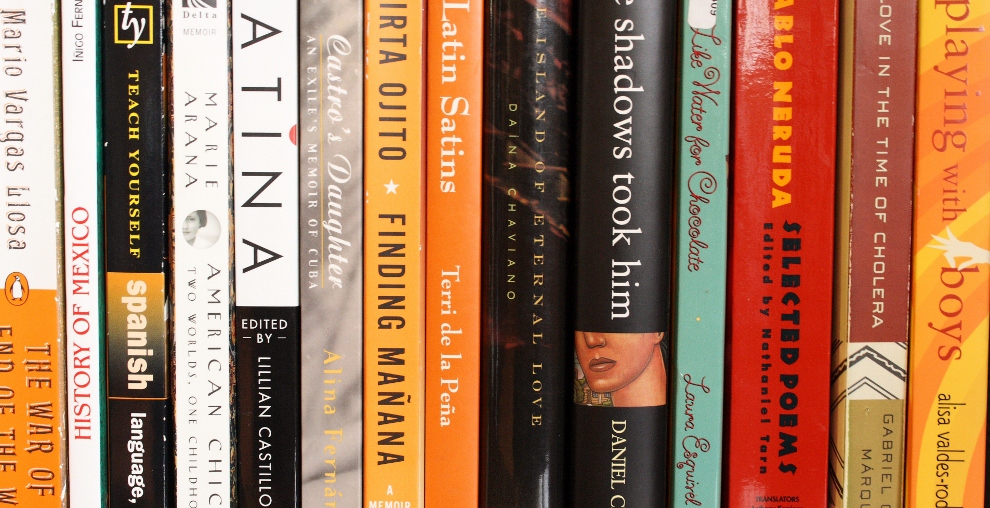Q&A with Rudy Ruiz + GIVEAWAY!
posted in: Uncategorized
After reading and reviewing Seven for the Revolution, I was fortunate to also be able to interview the author, Rudy Ruiz.
Ruiz grew up in Brownsville, Texas, and learned English when he entered school. Ruiz began writing as a child and has always used his experiences on the U.S.-Mexico border and his heritage as inspiration. A Harvard graduate, Ruiz founded Interlex Communications and published ¡Adelante! in 2003 and Going Hungry in 2008. He has written columns for CNN and his own website, Red Brown and Blue. Seven for the Revolution, his fictional debut, garnered several awards from the 2014 Latino Book Awards: First Place in Best Popular Fiction, the Mariposa Award for Best First Book – Fiction, and Second Place for Most Inspirational Fiction Book and Honorable Mention for Best Cover.
Read on for the interview after the jump, as well as to find out how to win my review copy of Seven for the Revolution.

1. Why did you decide to write this book?
I have been a writer since my childhood. And I’ve always drawn inspiration from my Latino heritage and personal and family experiences along the U.S.-Mexico border. The ongoing debate over immigration reform, and my passionate belief that as a whole immigrants make positive contributions to the fabric of American life, led to my decision to write Seven for the Revolution. I wanted to humanize the Latino immigrant experience to hopefully connect with people who might not empathize or understand it, and hopefully help them see things differently. I also wanted to capture different perspectives representative of the diverse lives, dreams, hopes and struggles of Latino immigrants to showcase and celebrate the Latino immigrant experience. To me, this Latino immigrant experience is the American experience…because we are a nation of immigrants.
2. What inspired your stories?
The desire to capture a range of experiences and do justice to the surprising diversity within the Latino community led me to develop this collection of short stories. Some of them are inspired by real people and events, from the stories my abuelita used to tell me about her father who served as a Colonel in the Mexican Revolution (The Colonel and His Bridge) to my own experiences growing up along the border (Bending the Laws of Motion). Others were inspired by events within which I placed fictional characters to frame stories and explore the issues and emotions surrounding those events, such as the immigration reform debate over the last few years (Pierce the Sky) and the border fence controversy (It’s My Wall Now). And finally, the last two stories peered into the future, imagining what might take place in a a world where America does not change its approach to immigrants and other cultures and peoples.
3. Why did you write from a multi-cultural perspective versus an only Mexican-American perspective?
Although I’m Mexican-American I really treasure the diversity of the Latino heritage. I think all too often non-Latinos hold a stereotypical or narrow view of what it means to be Latino or to be an immigrant. So, by taking a broader perspective I hoped to help convey to readers insightful glimpses into this diversity.
4. What is the significance of the stories set in the future?
The futuristic stories in Seven for the Revolution are cautionary tales. My belief is that America must become more empathetic, more inclusive, more appreciative of other cultures and collaborative with other nations. This includes embracing immigrants as a positive source of economic and cultural vitality for our nation. The stories are meant to portray the bleak future that might lie ahead if our country does not change its ways.
5. Do you believe that a dystopian future is a realistic probability for the U.S.?
Yes. I don’t know what that might look like or when it might happen. And I certainly hope that it does not happen. But the reason I believe that as writers and readers, even filmmakers and moviegoers, we are fascinated by dystopian fiction is because we all know the empires and great nations rise and fall. That is what history has taught us. And it is thought-provoking to imagine what the future might hold so that we can work as a society to prevent the worst of possibilities from becoming reality. For the most part, I believe that all dystopian fantasy and science fiction is a metaphor for the best and the worst in our world woven into a cautionary tale.
6. How do you view your book in the context of current events, i.e., the unaccompanied minors crisis?
I believe my book is very relevant to help readers who are personally removed from the unaccompanied minors crisis to empathize with the immigrant experience and to see that – depending on how we respond – these children could become our friends or our foes for the rest of their lives, and their children’s lives. If Americans can see and feel the humanity of this immigration crisis, then they will rise to the challenge and treat these children with generosity and dignity. Anything that can facilitate that is a good thing, whether that’s documentaries, news stories, articles, books or films. In my book I say that our borders define us. That’s a double entendre, of course. How we treat these children will speak volumes about who we are as a nation. My book is a call to welcome immigrants and their contributions.
7. Did you have a goal in mind when you read the book, or is it just pure fiction?
My goal was to write a book that would make people think in new and different ways, to reconsider their notions about what it means to be Latino, what it means to be an immigrant, what it means to be American. And ultimately, my hope is to uplift, enlighten and entertain. It is fiction, but within every story there are kernels of truth which I hope will touch people’s minds and hearts in memorable ways.
8. How did it feel to win the 2014 Latino Book awards?
I’m very honored and grateful to have been recognized. As a writer, you work in a vacuum for a very long time. So the acknowledgement is very encouraging and it helps garner more attention and readership. When I write, what I want most is for others to read my work and enjoy it, to remember it and take something from it, to enrich their appreciation and enjoyment of life and Latino culture. So I’m very grateful to the International Latino Book Awards, the judges that devote their time to this labor of love,
Latino Literacy Now, and their founder Edward James Olmos for this honor. I’m also very grateful to Kirk Whisler, who organizes the awards, and Nora Comstock of
Las Comadres Para Las Americas, who are partners in the awards and big supporters of Latino authors for the time and energy they put into making these awards and recognition possible.
9. Are there any other books in your future?
Yes! I’m very excited to be wrapping up a novel about a modern day Latino multi-generational family struggling to stick together and find meaning in the face of the challenges of acculturation and the pressures of reaching for diverse visions of the American Dream.
10. Do you have any advice for aspiring Latino authors?
For starters, write! Check out organizations like Las Comadres Para Las Americas, which puts on an annual conference for Latino writers (visit
latinolit.com). And don’t give up. Expressing yourself is vital to not only Latino culture but to the diversity that makes America great. Our story is the American story.
Win my review copy!
To enter, like my Facebook page and/or send a tweet!
a Rafflecopter giveaway

























